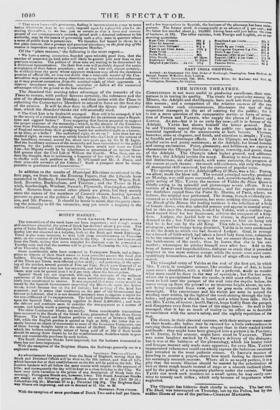THE MINOR THEATRES.
COMPETITION is not more useful in producing excellence, than coal. parison is in testing its quality. The rivals for popularity among the Minors, the Adelphi and the Olympic, have each lost their primo buffo this season ; and a comparison of the relative success of the two theatres under such circumstances, illustrates the tact of their respective managers in the art of catering for the public ; for it is not a mere question of the comparative merits or force of attrac- tion of POWER and FARREN, who supply the places of Reeve und LISTON. As yet—but it is an early day now—all is in favour of the Adelphi. YATES has shown himself the better general. Both he and VESTRIS appeal strongly to the public eye: spectacle is an essential ingredient in the amusements at both houses. VESTRIS, however, aims at elegance, and finish, and attention to details ; Yens, at forcible and picturesque effects. At the Olympic, we look for light playful satire and pretty sentiment ; at the Adelphi, for broad humour and strong excitement. Point, pleasantry, and brilliancy, we expect to characterize the Olympic burlettas; vigour, intensity, and gusto, those of the Adelphi. The Olympic takes higher ground, arid addresses the few ; the Adelphi invites the many. Bearing in mind these essen- tial distinctions, we shall watch, with sonic curiosity, the progress of
the season at each theatre : the result will evidence, not only the degree of manusgerial skill exercised, but the current of popular taste.
The opening piece at the Adelphi4Rory O'More, was a hit : Powee, we allow, made the blow tell. 'Fite seemd principal novelty, produced on Monday, was still more successful ; and, notwithstanding the ener. gene acting of Mrs. YATES, the success of Valsha the Stave Queen is chiefly owing to its splendid arid picturesque scenic effects. It is a version of a French historical melodrama ; and the superb costumes are doubtless copied from the Porte St. Martin, of Paris, where, we believe, the original was performed. The drama, thostah evidentlycon. structed as a vehicle for pageantry, has some striking site:I:ions. Like the Renault if the Harem, the leading incident is the rebellion of a body of female slaves, who don splendid armour and appear in martial array; but in this cese the Amazons, headed by Vulsha, with a warlike vaga- bond mimed Graf for her lieutenant, achieve the conquest of a king- dom. Ludgar, the lawful heir to the throne, is deposed and con. skinned to die ; but Valslia resigns the crown to bins on being told that he is ber son by the old King. This tale is, however, a mere stratagem ; and her troops being disarmed, Valsha is in turn condemned to die the death to which slue had doomed Ludgar. Graf, in revenge for a breach of faith which had taken a loved lady from him, volunteers to be the executioner of Valsha ; and has no sooner thrown her from the hattlemeuts of the castle, Otani he learns that site is his own mother ; whereupon he pitches himself over after her. Add to this heap of horrors and improbabilities, dialogue so crude that it provoked laughter in the most serious scenes, while the comic ones were corre- spondingly humourless, and the full force of stage effects may be esti- mated.
The tiitimphal entry of Val.sha at the end of the first act, in which Mrs. YATI:S, in complete armour, like another Juan of Arc, is borne upon atien's shoulders, with a shield for a pedestal, inside us wonder what snore could be done in the way of spectacle ; but the last scene, scheme she is precipitated from the castle, is still inure effective. You seem to look over the parapet of the wall into tile depths below, the tower rising up from the ground to an immense height shove, its sum- mit being concealed from view, and its gray walls silvered by the moonlight. The executioner and his victim are seen to ascend the winding stair within, by the light of the torch shining through the loop- holes ; mid presently a shriek is heard, and a white form falls : this is not Mrs. YATES, of course ; but 0. SMITH, leaps bodily from the parapet, and disappears even from the view of tile stage-boxes. So well is this managed, that it has as much of reality in its effect as is desirable or consistent with the actor's safety, and the nightly repetition of the
feat.
The slaves, in their classical costume, with their antique water-vases on their heads—the ladies may be excused for a little awkwardness in
carrying them—looked much more elegant than in their mailed kirtles and hoods : they might have been grouped into a picture il-la-Poessitt; us 0. Small, in his armour, might have stood to VANDYKE. There was some laughter excited by 0. SMITH'S delivery of the dialogue; but it was at the baldness of the phraseology, which his hoarse voice and brusque manner only made more apparent ; fur even Mrs.. YATES'S impassioned vehemence could not wholly repress the ludicrous emotions that intruded in the most pathetic scenes. 0. SMITH'S manner of kneeling to mutter a prayer, shows bow much feeling he throws into his seemingly uncouth manner. Where all is so nearly perfect, it Is* pity that the scenic illusion should be marred by the substitutions of two or three rough boards instead of steps or a smooth inclined plane, and by the poking of a temporary platform under the curtain.When YATES can work such wonders on a entail space, he may easily con- trive to remedy such trifles ; which only become of importance when neglected.


























 Previous page
Previous page